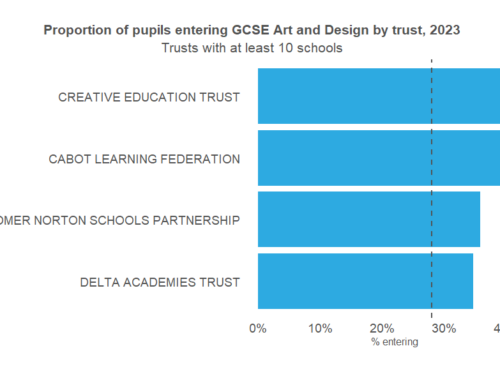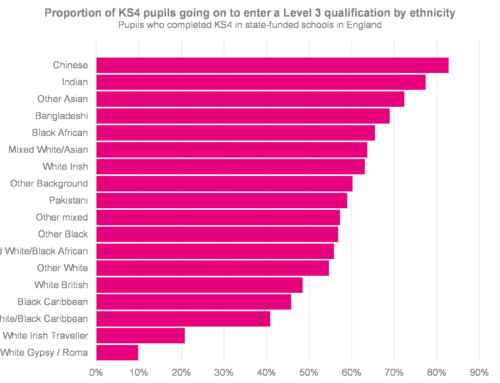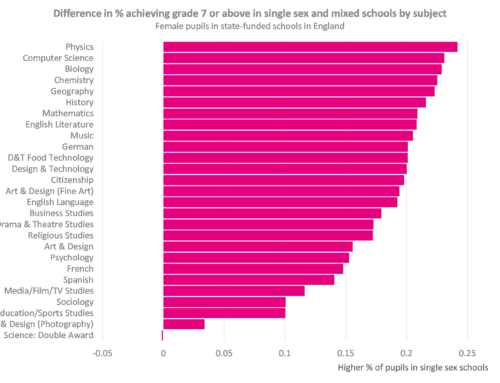[This post was updated at 18.15 on 24th August 2017 to amend 2016 figures for maths]
One bit of good news from this year’s GCSE results is that the percentages of 17-year-olds in England achieving A*-C grades in English have gone up. However, working out by just how much they have improved is made slightly complicated by changes in the types of qualifications entered.
What is perhaps surprising (to me if no-one else), is the number of post-16 entries in reformed (9-1) GCSEs.
Legacy (A*-G) GCSEs were available for resits, yet 65% of entries in English and 18% of entries in mathematics were in the new specifications.
Those entering the reformed qualifications were more likely to achieve a grade 9-4 (A*-C in old money) than those who took the legacy qualifications.
Attainment in GCSE English and mathematics, students in England aged 17+, June 2017
| Legacy | Reformed | Total | ||
| English | Entries | 47,541 | 88,340 | 135,881 |
| C+/4+ | 23% | 35% | 31% | |
| Maths | Entries | 137,441 | 30,100 | 167,541 |
| C+/4+ | 23% | 37% | 25% |
Source: JCQ
A comparison with 2016 is complicated by the fact that last year’s crop of age 17+ students entered a mix of GCSEs and regulated IGCSEs[1].
Using JCQ data for GCSEs and published DfE data (which might not be entirely comparable with the JCQ data used for the table above), gives that 29% of entries in English and 28% of entries in maths by students aged 17+ resulted in grades C or above in 2016 when IGCSEs and GCSEs are added together.
(Curiously, the DfE and JCQ figures for GCSE maths seem to differ. JCQ data suggests 29% of entries were graded A*-C but the DfE data only 22% despite numbers of entries being relatively similar).
Attainment in GCSE and IGCSE English and mathematics, students in England aged 17+, June 2016
| GCSE | IGCSE | Total | ||
| English | Entries | 116,821 | 42,014 | 158,835 |
| C+/ 4+ | 24% | 43% | 29% | |
| Maths | Entries | 160,783 | 3,635 | 164,418 |
| C+/ 4+ | 29% | 14% | 28% |
Source: JCQ(GCSE) and DfE (IGCSE)
And, Ofqual entry data shows that 14,000 age 17+ students still entered IGCSEs in English in 2017. (Very few students did likewise in maths.) Their results would really need to be added to the 2017 table above to give a complete picture of attainment, but IGCSE results data is not yet available, and they are much fewer in numbers than previous years.
That notwithstanding, comparing these 2016 and 2017 figures shows a 2 percentage point increase in A*-C (or 9-4) attainment in English and maths – from roughly 29% to 31% in English. However, maths fell slightly from 28% to 25%.
What about resitters next year?
Many, but by no means all, of these students will have taken GCSEs due to the 16-19 conditions of funding which stipulate that students with a grade D in English or maths must enrol for a resit during their post-16 studies.
Yesterday, Laura McInerney wrote with concern in Schools Week about the numbers of students who will be compelled to resit English or maths GCSEs next year might increase.
Up to now, it has just been those (specifically) with a grade D who have had to resit. From this coming year, it will be those who achieved a grade 3. And, under the way the new grading system works – with fewer grade divisions towards the bottom end of the scale – a grade 3 was expected to be equivalent to the old grade D and the top end of grade E [PDF].
Last year we showed that less than half of those who achieved a grade E in maths in 2014 improved their grade in their 2015 resit. And they were students for whom a resit was not compulsory. So if more of those who achieved a grade E were forced to resit, the percentage improving their grade would be lower still.
Fortunately, things might not turn out so bad next year after all.
It appears that 12.4% of 16-year-olds in England achieved a grade 3 in maths this year. But if we look at 2016 data (combining GCSEs and regulated IGCSEs in Table S3, [XLS]), 13.6% achieved a grade D – translating to at least 6,000 fewer pupils in this year’s cohort who will have to take a maths resit than would otherwise be the case, and notwithstanding a reduction in cohort size.
(Things in English are not so clear, where a grade 4 or higher in either English language or English literature can save a pupil from having to take a resit.)
But does this mean that some 16-year-olds who achieved a grade 2 this year might have achieved a D in the past?
Want to receive other results day blogposts by email? Sign up to our mailing list to get notifications about new blogposts, or to receive our half-termly newsletter.
1. Pearson and Cambridge Level 1 and Level 2 certificates





Leave A Comment